Mahama Refugee Camp Opens Two Health Centers
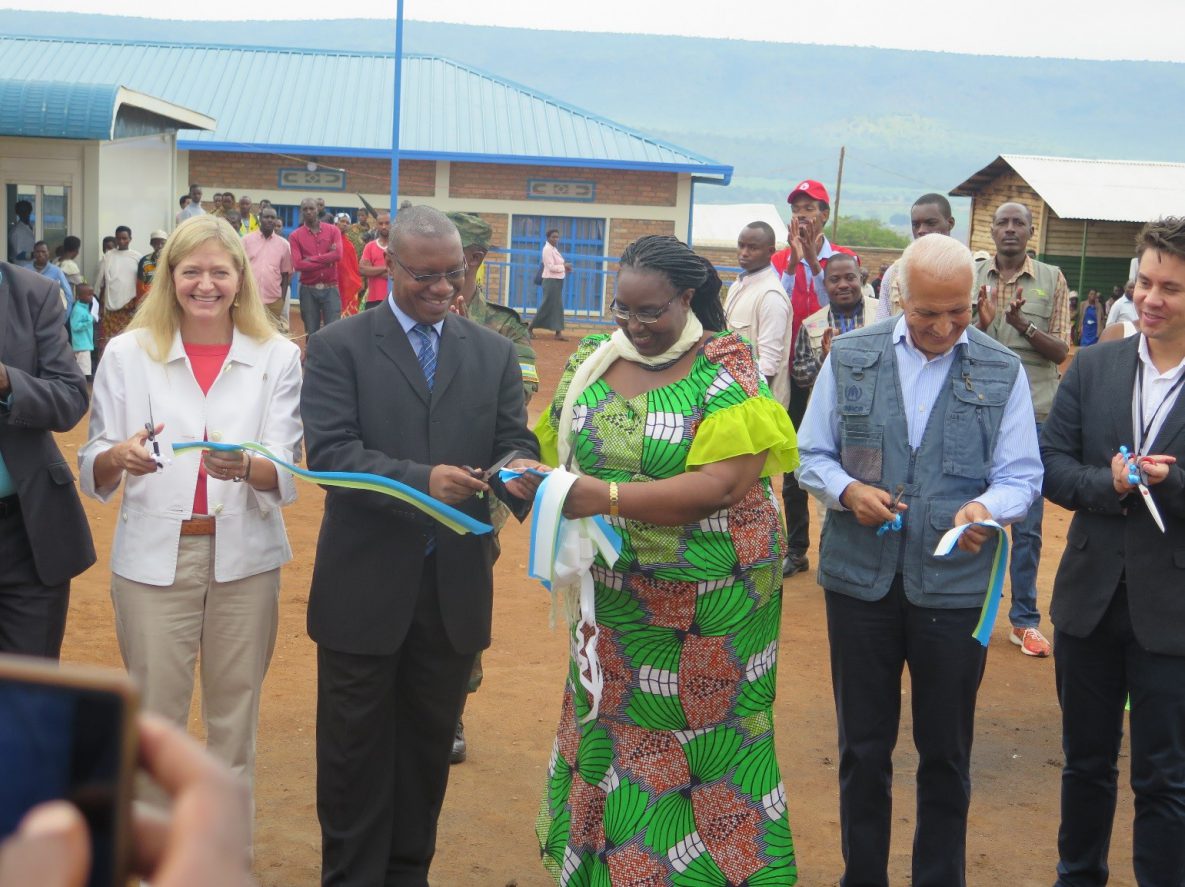
(From Left to Right: Amb. Barks-Ruggles, with Dr. Patrick Ndimubanzi, Minister of State for Public Health and Primary Health services, Hon. Mukantabana, Minister of Disaster Management and Refugee Affairs, and Dr. Azam of UNHCR at the ribbon cutting ceremony to mark the official opening of the Mahama Health Centers. Photo: CDC/E. Karekezi)
On January 26, 2017 the U.S. Ambassador to Rwanda, Ambassador Barks-Ruggles, co-officiated the opening of two health care centers at the Mahama Refugee Camp in Kirehe District, Eastern Province of Rwanda. Other dignitaries present included the Minister of Disaster Management and Refugee Affairs (MIDMAR), Hon. Seraphine Mukantabana; the Minister of State for Public Health and Primary Health Care, Hon. Patrick Ndimubanzi, and UNHCR Representative, Dr. Saber Azam.
As a humanitarian response to thousands of Burundians fleeing violence in their country, the Mahama Refugee Camp was established in April 2015 by Rwanda’s MIDMAR with support from the United Nations High Commissioner for Refugees (UNHCR). Today, over fifty thousand refugees live in the camp, making it the largest refugee camp in Rwanda. The camp’s large population is about the same size as the population of Muhanga town, the sixth largest town in Rwanda.
Almost half of the refugees at the camp are children. Due to the large number of children from the camp who attend classes at the Paysannat School, it is now regarded as the largest school in Rwanda.
The large population at the camp has been further strained by a steady stream of approximately twenty refugees arriving at the camp each day. The number of refugees in the camp have put a great strain on the capacity of the camp’s two outdated health centers – particularly on the laboratory services, which are essential for effective and efficient medical diagnosis. To address this problem, the American Refugee Committee (ARC) and Save the Children International, with support from the U.S. Embassy in Rwanda, renovated and upgraded the two health centers and their respective laboratories in 2016. The U.S. State Department contributed to the funding support to renovate and re-equip the laboratories, while the U.S. Centers for Disease Control and Prevention (CDC) provided the technical assistance required to maintain high laboratory standards at the new facilities.
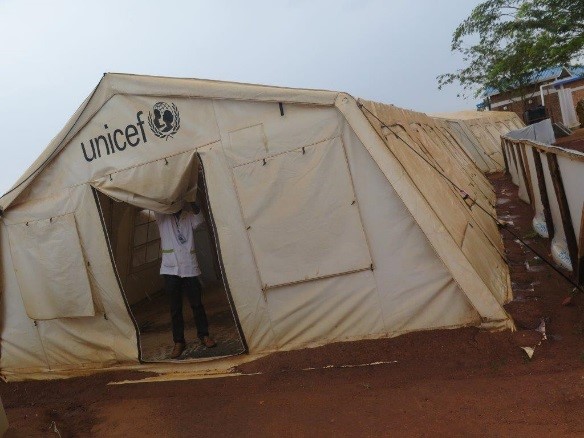
Photo of the old laboratory at Mahama 1, Refugee Camp. Photo: CDC/E. Karekezi
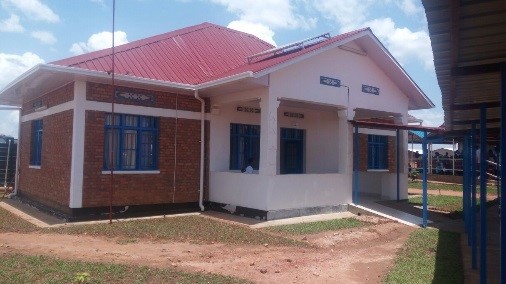
The newly renovated lLaboratory health center building for Mahama 1 Camp –with new lab.
Since the government of Rwanda requires all Burundian immigrants to be screened and vaccinated against Yellow Fever, the renovated laboratories provide the facilities to meet this requirement for people arriving from Burundi to be allowed into the country. The laboratories at the Mahama refugee camp also play a large role in the support of the Ministry of Health’s immunization program, particularly with the critical issue of vaccination storage and its administration.
The two health centers, known as Mahama 1 Health Center and Mahama 2 Health Center, serve both sections (Mahama 1 and Mahama 2) of the camp. Both health centers were upgraded with new equipment and had their medical isolation facilities and laboratories renovated. The renovations involved retiling the labs, painting, replacing windows and glass panes, and buying laboratory furniture and equipment.
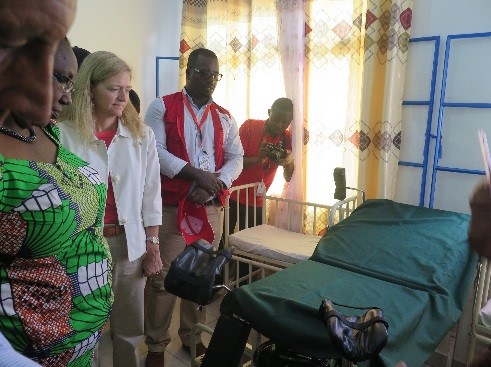
A tour of the new health centers. Photo: CDC/E. Karekezi
About 80% of all medical decisions are based on laboratory results. The newly renovated laboratories will be used to perform routine laboratory tests, and additional equipment and training will be included to increase the laboratories’ ability to rapidly and accurately detect pathogens responsible for common disease outbreaks in the refugee population. Both health centers now have laboratories that provide basic services including tests for HIV, pregnancy, malaria, parasitology, chemistry, and hematology, as well as having the capacity to detect and respond rapidly to the potential disease outbreaks. The laboratories send samples for specialized tests to Kirehe and Kibungo District Hospitals.
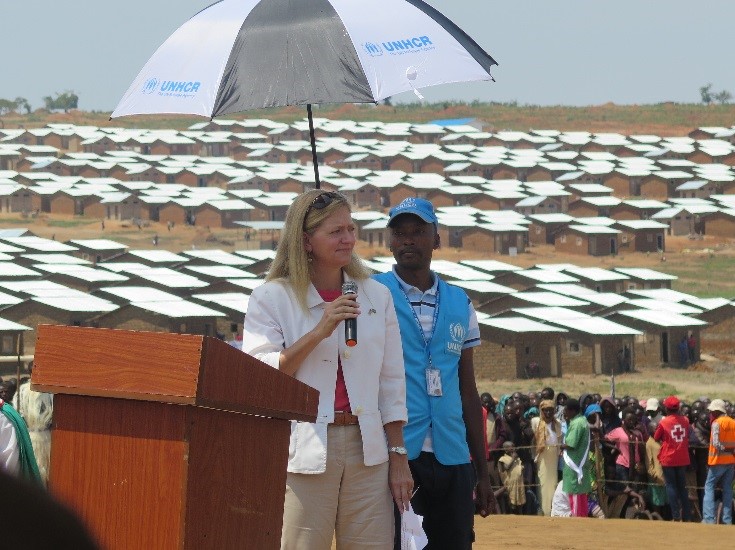
Amb. Barks-Ruggles addresses a gathering at the official opening of the Mahama Health Centers. Photo: CDC/E. Karekezi
These new laboratories, equipped with automated testing equipment to enhance accurate and rapid laboratory testing services, are equivalent in many ways to a district hospital laboratory. It is uncommon for a laboratory in a refugee camp to have similar or better equipment than some district hospitals. One of the refugees attending the event said, “We are grateful to the government of Rwanda and to the United States government. [Now] Our wives will not have to travel for 15km to deliver at Kirehe or Kibungo District Hospitals.” (Quote by a Mahama Camp refugee who wishes to remain anonymous)
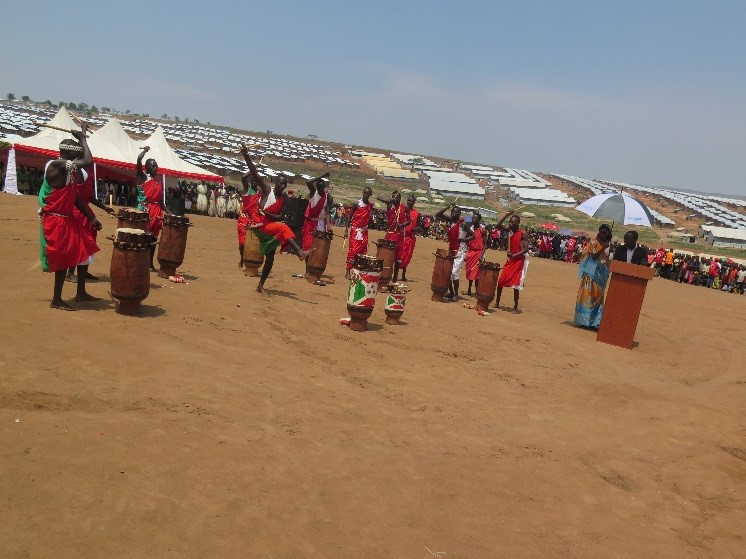
Dance troops made up of Burundian refugees from the camp entertain guests at the official opening of the two health centers at the Mahama Refugee Camp. Photos: CDC/E. Karekezi
During her address at the official opening, Ambassador Barks-Ruggles commended the new health care centers for their ability to improve the quality of health care service delivery at the camp, and for the improved physical arrangement at the new health centers that would offer patients greater privacy during treatment. The Ambassador added,
“I am impressed with the improvement in the living conditions for refugees at Mahama camp. The USG is a major donor of UNHCR operations providing about 60% of the total budget of UNCHR in Rwanda. The USG is committed to continued collaboration with UNHCR and the Rwandan government to improve living conditions of refugees.” Dr. Saber Azam, UNCHR representative, urged the refugee community at the camp to “Respect country regulations and desist from engaging in unlawful activities” while Hon. Seraphine Mukantabana, MIDIMAR Minister, reminded the Mahama Camp refugee community to, “Treat every Rwandan with dignity and respect because they also have hosted you respectfully.”
The joy demonstrated by the refugee community through songs and colorful traditional Burundian dance showed the importance of the opening of these two health centers for the refugee community at the Mahama Refugee camp.